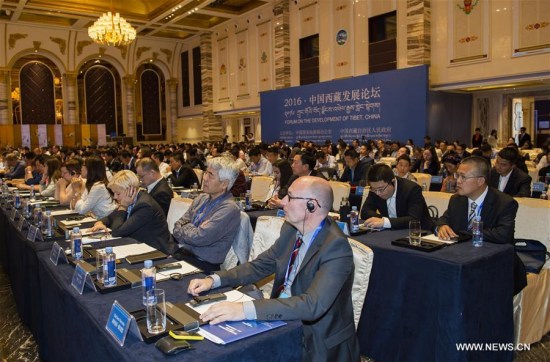
The Forum on the Development of Tibet concludes in Lhasa, capital of southwest China's Tibet Autonomous Region, July 8, 2016. (Xinhua/Liu Dongjun)
Foreign researchers and journalists attending the Forum on the Development of Tibet have been awestruck by what they have seen in the regional capital Lhasa.
The Tibetan miracle is the result of massive effort by the Chinese government to foster productive enterprises, said Mewati Sitaram Bholaram, a senior correspondent with India's Mumbai Messenger.
Infrastructure in Tibet has reached a level which allows the area to become an integral part of the Chinese and global economies. Tibet has steered itself into the fast lane of development together with the rest of China, he said.
More than 130 researchers, officials and journalists from over 30 countries and regions attended the two-day forum on Thursday and Friday.
Hosted by the State Council Information Office and the Tibetan regional government, the forum focused on entrepreneurship and industrial modernization in Tibet, preserving tradition, environmental protection, regional infrastructure and poverty relief.
Russian editor Maksim Belov of the Beijing-based China Pictorial magazine described the development of Tibet as almost beyond imagining. Amazing achievements have been made in the education and health systems despite the harsh climate and rough terrain. Tibetans, including rural Tibetans, enjoy satisfactory living conditions, he added.
Stefano Vernole, a researcher with Italy's Eurasia-Mediterranean Study Center, said that Tibet is completely different from how it was in 1950s. The Tibetan people have freedom, equality, dignity and enjoy the fruits of modern civilization. Development and progress in the region reflect the common aspirations of all ethnic groups in Tibet, he added.
Farhana Paruk, a researcher at the University of South Africa, said economic and social development has turned Tibet into a developed region from a rural community, creating a better standard of living for the average Tibetans.
In 2015, the per capita disposable income of urban residents in the region was 25,457 yuan (3,807 U.S. dollars), compared with 565 yuan in 1978, and that of farmers and herdsmen last year was 8,244 yuan, representing an average annual increase of 12 percent, according to government statistics.
Some foreign experts also made suggestions on the future development of Tibet.
Christine Davis, vice president of the U.S. Asia Society, said Tibet could play an important part in the Belt and Road Initiative since it connects other provinces in China with South Asia, Central Asia and other regions.
Thanong Khanthong of the Thailand National TV Station, said the government should put more emphasis on sustainable tourism. "This will not only increase the incomes of Tibetans but will promote regional economic growth," he said.
His view was echoed by Maksim Belov who took Russia as an example. An increasing number of Russians want to visit Tibet but there are no direct flights linking Moscow and Lhasa.
"Currently, tourists from Russia have to fly to Beijing and change planes to reach Lhasa," Belov said. "I hope a direct flight from Moscow to Lhasa will open soon."


















































